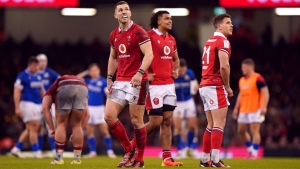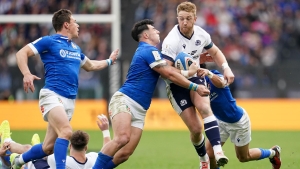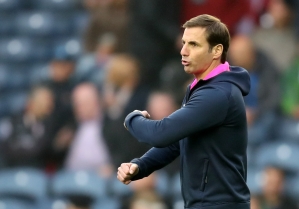Wales suffered the ignominy of a first Six Nations wooden spoon since 2003 after Italy posted a 24-21 victory over them in Cardiff.
Not even George North’s farewell appearance before international retirement – he suffered an injury late in the game and was helped off – could lift a dismal Wales effort in suffering a fifth successive Six Nations defeat this season and finishing bottom of the table.
It was a thoroughly deserved Italian win and came via tries from wing Monty Ioane and full-back Lorenzo Pani, with fly-half Paolo Garbisi kicking three penalties and a conversion and Martin Page-Relo landing a late penalty.
While Wales boss Warren Gatland has pleaded for patience as he embarks on an extensive post-World Cup rebuilding job, stark statistics cannot be avoided as late tries from Elliot Dee, Will Rowlands and Mason Grady, with Ioan Lloyd kicking two conversions and Sam Costelow one, provided scant consolation.
Wales have now suffered seven successive Six Nations home reversals, two on the bounce to Italy and won just one game from 10 starts in the tournament since Gatland returned for a second stint as head coach.
Italy had propped up the table for eight campaigns in a row, but they avoided that fate this time around, and the Cardiff mood was in stark contrast to five years ago when Wales stormed to the Six Nations title and a Grand Slam by crushing Ireland.
The Azzurri, though, could reflect on a memorable campaign that also saw them defeat Scotland and draw with France in Lille.
And life is not about to get any easier for Gatland or his players. Their next game is against world champions South Africa in June, followed by a two-Test tour of Australia.
Wales monopolised early possession without making any real attacking headway, and Italy went ahead when Garbisi booted a sixth-minute penalty.
Italy comfortably absorbed continued pressure from Wales, before Garbisi doubled their lead through a second penalty after North infringed by not releasing the ball on the floor.
And Wales’ promising start soon unravelled, with North’s midfield partner Nick Tompkins dropping a pass and Italy storming upfield to post an outstanding try.
Garbisi, centre Tommaso Menoncello and lock Federico Ruzza combined superbly, setting up a strong attacking platform before Wales were unlocked defensively when Ioane sprinted through a gap and touched down.
Garbisi missed the conversion, but Italy had an 11-point advantage after 20 minutes, leaving the wooden spoon hovering closer into view for Wales.
The home side were at sixes and sevens, a situation underlined when a defensive mix-up between Sam Costelow and Cameron Winnett saw the ball knocked-on to gift Italy an attacking scrum 20 metres out.
Although the Azzurri could not capitalise, there was continued uncertainty and hesitancy from Wales, and even when they established a threatening position inside Italy’s 22, Tompkins knocked on again.
Wales looked completely fazed by the occasion, in contrast to Italy’s largely calm and assured presence, and an 11-0 interval lead confirmed a sense of control for the visitors.
It had been an opening 40 minutes for Wales as poor as the first half against Scotland in their Six Nations opener, when the Scots built up a 20-point advantage.
Italy struck again just six minutes after the restart, with Ioane heavily involved and Pani producing a blistering finish as he cut back inside Wales wing Rio Dyer. Garbisi’s conversion put them 18 points ahead, with seemingly no way back for Wales.
Gatland began ringing the changes, and a glimmer of hope was provided when Dee crashed over for a try 16 minutes from time that Costelow converted.
But Garbisi snuffed that out when he kicked a 45-metre penalty, and Page-Relo then found the target from even longer range as Wales’ abject Six Nations season reached its sorry conclusion despite late tries from Rowlands and Grady.






























